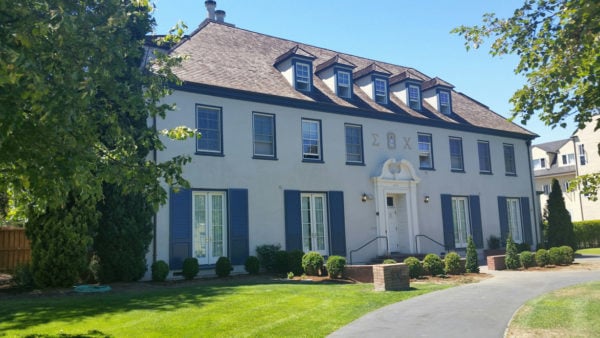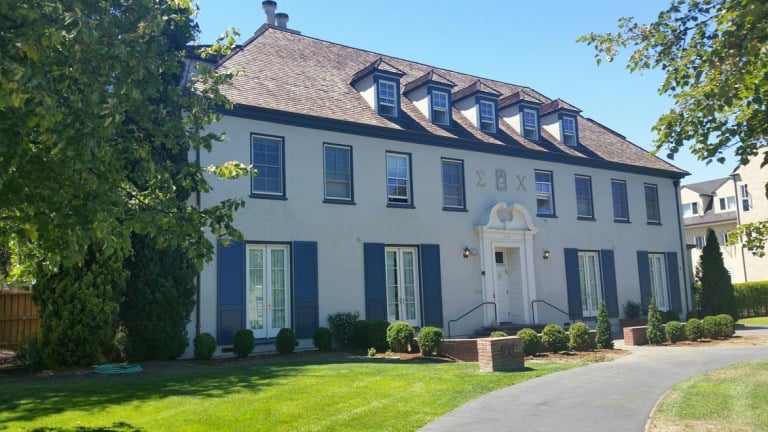
Stanford Sigma Chi, Alpha Omega chapter, is celebrating its 125th anniversary this weekend, marking it as the only fraternity continuously residing on Stanford’s campus since the University’s founding. Festivities for the 125th anniversary began with a kickoff dinner for active members and 200 to 300 alumni at the Faculty Club on Thursday night.
The festivities are co-hosted by the chapter, headed by president and former Daily staffer Jordan Wallach ’17 and its Housing Corporation, headed by Bob Ottilie ’77. They recognize the chapter as the only continuous fraternity on campus for 125 years, chartered at the University in 1891.
“A lot of the values that I’ve learned in Sigma Chi have been really applicable to my day-to-day life, and since Sigma Chi has given so much to me, I wanted to give back,” Wallach said. “I’m honored to be the president of the house at this time.”
“There is a tremendous amount of opportunity for our organization to be a leader on the campus, and we are responsible to provide and perpetuate leadership through an active alumni organization,” Ottilie added.
Milestone
The 125th celebration highlights some of the most notable examples of Sigma Chi leadership in its history.
In the 1960s, Stanford Sigma Chi pledged its first African-American student. National Sigma Chi alumni vetoed the pledge, and in response, the Stanford chapter was the first to withdraw from the international Sigma Chi organization. Once all chapters revised its policies, the Stanford chapter became rechartered with Sigma Chi in 1974.
In 2002, the University mandated that the chapter conduct at least $600,000 of seismic improvements to the house. The chapter worked out an agreement to sell its house to the University to finance the renovations because monetary gifts to fraternity houses are not considered tax deductible.
A group of alumni, including Ottilie, came out in opposition to the agreement. This new Housing Corporation worked closely with Roger Whitney, Stanford’s Chief Housing Officer, to set a campaign goal of $3 million for independent renovations. The chapter also worked with the University to obtain a private letter ruling from the Internal Revenue Service (IRS) that made donations toward the renovation tax deductible due to the location of the house on Stanford property. They reached this goal through alumni donations and also received an additional $1 million contribution in the form of construction from John Arrillaga, whose son had lived in the house. Construction took place in 2006.
Ottilie attributes the success of this endeavor to the chapter’s close collaborative relationship with the university.
“If you’re going to succeed at anything, you have to have solid relationships, and Stanford has consistently been our partner in everything we do, not withstanding,” said Ottilie.
Sigma Chi remains the only privately-owned student residence.
Alumni support
Ottilie also attributes the chapter’s lasting presence to its active alumni support. The chapter is the only house on campus that works with alumni and national-level chapter advisors on a daily basis. Over the next two years, the Housing Corporation is recruiting over two dozen alumni for an in-house leadership speaker series.
“Sigma Chi itself has been a course in leadership for me,” said Wallach. “I wouldn’t have been able to find the leadership training that I did anywhere else on campus. A lot of that is dealing with real problems on a day-to-day basis, and a lot of that is learning from the alums in the House Corporation and the chapter advisor.”
Sigma Chi has adapted in recent years through an aggressive risk management program jointly supported by the brothers and the Housing Corporation. In 2013, the thorough program was recognized as the best for Sigma Chi internationally.
Ottilie and the corporation mentor the brothers to constantly assess risk inherent to daily life in the house, from hosting parties to alcohol consumption. They conduct biannual risk management training sessions.
“The risk management training goes along with the theme of extra responsibility of owning our own house and of collective responsibility … it’s embedded in the culture,” Wallach said.
Changes in social life
A Sigma Chi-specific party-planning policy is an integral part of the chapter’s risk management strategy. The chapter and Housing Organization implemented a new policy in 2006, and since then, the house has had no major alcohol-related incidents at its parties.
The chapter also has specific alcohol policies. Starting in August 2012, the house banned all hard alcohol and additionally banned alcohol in common spaces and amplified music from 2 a.m. Sunday until 8 p.m. Thursday.
“[These changes] had a dramatic impact on the number of incidences that we were having with our tenants related to alcohol and a dramatic impact on the quality of our residence,” said Ottilie. Wallach believes the university’s new alcohol policy has not changed the house culture.
Additionally, the fraternity has designated drivers and sober monitors Thursday through Saturday nights and stopped serving alcohol at all-campus parties starting last year.
“All of these changes have been made in concert with me and other members of the house,” Wallach said. “I think it is important to get buy-in from the entire chapter. We want the house corporation and everyone to be on the same page, and we want to agree on the path we want to go down.”
The chapter is carrying on its spirit of progressivism through extensive philanthropy and a new pledge program, Preparation for Brotherhood. Last school year, the brothers raised $4,500 for the Huntsman Cancer Foundation. Preparation for Brotherhood is marketed as a “Blended Instructional Approach” to pledging. It includes literary exercises, historical learning, a journal and e-learning modules.
The chapter and the Housing Corporation hope to use the 125th anniversary as another milestone in Sigma Chi’s presence on campus.
Update: This article was updated to reflect the fact that Jordan Wallach was formerly a Daily staff member.
Contact Caroline Kimmel at ckimmel ‘at’ stanford.edu.
